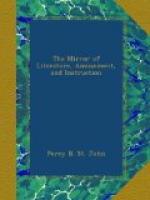Subscriber and friend.
The solution, or attempt at solution, of Hen. B.’s difficulty as to what Goldsmith means in his poem “Retaliation” when he concludes his ironical eulogium on Edmund Burke, thus:—
“In short ’twas his fate,
unemployed, or in place, sir,
To eat mutton cold, and cut blocks with
a razor.”
By being “unemployed” it is presumed that he was not engaged in the ordinary avocations of life, or in other words was not engaged in those legitimate avocations which have for their object the procuring the means of subsistence for the masticator; but if it is meant to have a name of extensive meaning, the solution is unanswerable.
Assuming the former to be Goldsmith’s meaning, the answer to be given to the solution might be that eating mutton cold, is eating cold mutton in its cold state, cooked or uncooked; but if the more general meaning is insisted upon, I cannot see how the masticator is unemployed, as his jaws which form a most material part of himself—are set in full motion by the operation of eating—hence full employment is given them—and as much to the “he” who is the owner of such jaws.
* * * * *
FINE ARTS.
* * * * *
Exhibition of the royal Academy.
(Continued from page 338.)
91. Portrait of the late Earl of Kellie, Lord Lieutenant of the County of Fife.—D. Wilkie.—A noble portrait, painted for the County Hall, Cupar.
92. Night.—H. Howard—An exquisite scene from Milton:—
“------------now glowed the firmament With living sapphires: Hesperus that led The starry host, rode brightest, till the moon, Rising in clouded majesty, at length Apparent queen unveiled her peerless light, And o’er the dark her silver mantle threw.”
102. Portrait of the Duchess of Richmond.—Sir T. Lawrence.
110. Cardinals, Priests, and Roman Citizens washing the Pilgrims’ Feet.—D. Wilkie.—This ceremony takes place during the holy week, in the Convent of Santa Trinita dei Pelligrini; and Mr. Wilkie has infused a devotional character into this picture which is highly characteristic of Catholic solemnity.
127. Portrait of Jeremy Bentham—H.W. Pickersgill.—An admirable likeness of the veteran-patriot and political economist.
128. The Defence of Saragossa.—D. Wilkie.—The subject is so well explained in the Catalogue, that we quote it:—
“The heroine Augustina is here represented on the battery, in front of the convent of Santa Engratia, where her husband being slain, she found her way to the station he had occupied, stept over his body, took his place at the gun, and declared she would herself avenge his death.




